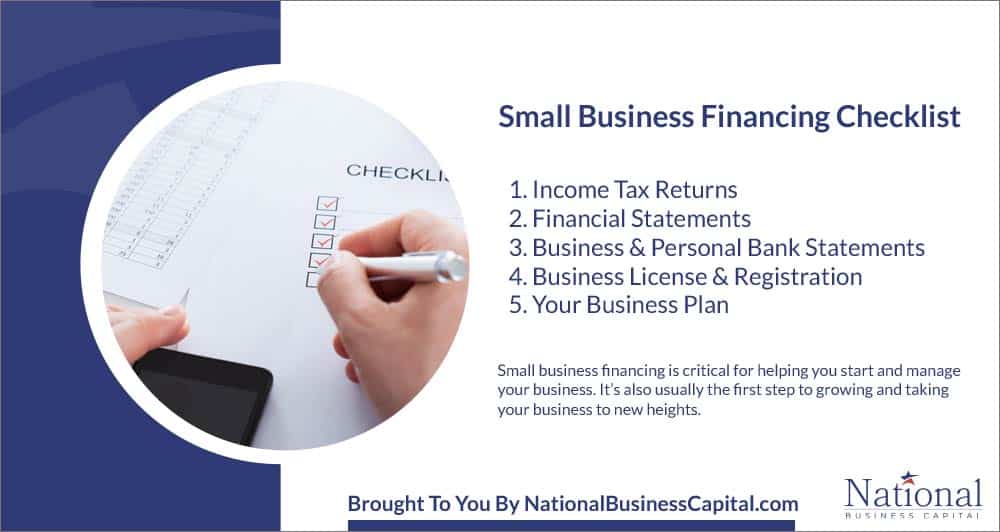Table of contents
Small business financing is critical for helping you start and manage your business. It’s also usually the first step to growing and taking your business to new heights.
The exact requirements for business financing will depend on the specific type of lender you work with. For example, banks tend to be more strict while online lenders are known for being more lenient. Nevertheless, no matter which type of lender you work with it helps to be prepared.
Gathering the required documents and knowing the answers to some basic questions ahead of time can make the overall process smoother. You’ll save time and even cut down on possible errors.
Before you begin applying for financing, make sure to first go through these questions.


Why do you need financing?
There are multiple reasons to seek out small business financing, and pinpointing your exact goals brings you closer to the right product. Are you looking to upgrade existing equipment or make necessary repairs? In this case, you can take out a business loan, but an equipment financing loan may work even better. Perhaps you’re looking to ease cash flow disruptions or cover day-to-day expenses, but you’re not sure exactly how much you’ll need. In this scenario, a business line of credit may be more appropriate than a traditional term loan. When you sit down with your lender, having a clear intention on why you need financing will help ensure your needs are met.How will you use the funds?
This ties into the above question - but requires further detail. After all, some lenders may ask to know the specifics. If you’re looking to expand your business, do you plan on accomplishing this by hiring more employees, investing in marketing, or renting a new space? If you’re looking to purchase equipment, what type of equipment are you eyeing? In other words - what’s the model, brand, and cost? Traditional lenders, like banks, may even go so far as to require you to present a formal business plan. No matter your lender, having your plans laid out ahead of time will only work to your advantage.When do you need the funds?
Depending on what your funding goals are, you may or may not be under a time crunch. Banks and credit loans have notoriously long application processes, while online lenders have been known to offer turnaround times of less than 24 hours in some cases. Identifying your ideal timeframe will help you select the right financing product and lender.How much will you need?
Knowing how much capital you’ll need will determine your funding amount, as well as your interest rates and terms. It’ll also help you avoid a situation where you’ve borrowed too much or you find yourself running out of money. You can estimate your future costs by researching and obtaining quotes. If you’re still unsure about your ideal funding amount, talk to your lender about your situation. They might recommend a business line of credit, which would allow you to withdraw funds as expenses come up.What’s your ideal repayment schedule?
Longer repayment terms tend to cost more over the lifetime of a business loan, but feature smaller, regular payments. Shorter repayment terms can eat into your cash flow, but they can also help you save more in the long run. Looking at your revenue projections can help you estimate how much you can afford to make in payments and what your ideal repayment schedule would look like.How strong is credit?
Both your personal and business credit scores hold a ton of weight when it comes to securing business financing. Higher credit makes it easier to qualify for lower rates and better terms on financing products. However, low credit can leave you paying more for the same lending product or being rejected altogether. Some lenders may emphasize your credit score more than others. For example, banks are known to reject most business applications with less than good credit, but online lenders can be more flexible in helping you find options.Your small business financing checklist
Preparing these documents before you apply for small business financing can make a big difference in simplifying and speeding up the process. Take a look at what you’ll need.1. Income tax returns
You should always count on lenders asking to review both your personal and business tax returns. The number of years you’ll have to go back can vary depending on the specific lender, but some have been known to go as far back as 3 years. Keep in mind that your business’s profitability on your tax returns can determine your ability to obtain small business financing. Many deductions and large expenses can actually work against you since they make your business appear less profitable.2. Financial statements
The most common financial statements lenders typically ask for include balance sheets, assets and liabilities, cash flow documents, and more. Some lenders may also ask you for financial projections. Before you submit these documents to your lender, take the time to ensure all the information is correct and the numbers add up.3. Business and personal bank statements
Most lenders will ask to review both your personal and business bank statements. Lots of personal debt and other issues can appear as a red flag to lenders, and affect your ability to secure a business loan.4. Business License and Registration
Get a hold of your business license and registration - either a physical copy or digital copy should work fine. Make sure to also grab any supporting legal documents and articles of incorporation.5. Your Business Plan
A formal business plan isn’t typically required by online lenders, but banks and more traditional institutions will definitely want to see one. Your business plan should include an introduction to your business, industry, management team, and goals. It should contain your reasons for financing as well as your anticipated use of funds. It helps to ask your lender beforehand about the details they’d like covered in your business plan. Make sure to have trusted colleagues or business associates read over it before you submit it.How to simplify the business financing process
The business financing process may seem complicated, but as long as you follow the steps outlined above, things should run smoothly. Nevertheless, it may help to have an expert on your side. At National, the top-rated business financing marketplace, we ensure all of our clients have a dedicated Business Financing Expert at their side to answer any questions and help them make the best decisions. Learn more about fast funding, flexible requirements, and a wide range of personalized business financing solutions offered by National. Apply now. Related articles- Fast, Simple & Easy Small Business Loans to Take You to the Next Level
- Why Cash Flow Is Important—and Most Businesses Need a Boost
- How to Use Business Financing to Grow Your Business Easier & Faster
- What’s the Easiest Way to Get a Business Loan?
- Understanding the Loan Application Process






